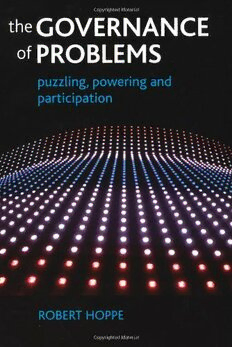
The Governance of Problems: Puzzling, Powering and Participation PDF
314 Pages·2010·2.742 MB·English
Most books are stored in the elastic cloud where traffic is expensive. For this reason, we have a limit on daily download.
Preview The Governance of Problems: Puzzling, Powering and Participation
Description:
Policy analysis usually gives more attention to problem solving than problem finding and there is a real threat of mismatch between problem perceptions by citizens and problem definition by their elected and appointed policy makers. Contemporary democracies need to develop a better governance of problems, as all too often, policy is a sophisticated answer to the wrong problem. This book offers a compelling new approach to public policy-making as problem processing - problem-finding, problem-framing, problem-structuring, problem-definition and problem-solving. It brings together aspects of puzzling, powering and participation, relating them in interesting and different ways to cultural theory, to issues about networks, to models of democracy and modes of citizen participation. The author pays serious attention to creating the institutional conditions for more reflexive, deliberative practices of problem structuring in governance structures. The book, which is part of a growing body of work in policy analysis literature, is clearly written and accessibly presented. Key points are lucidly set out and well illustrated with examples, making this an ideal text for academics and postgraduate students.
See more
The list of books you might like
Most books are stored in the elastic cloud where traffic is expensive. For this reason, we have a limit on daily download.
